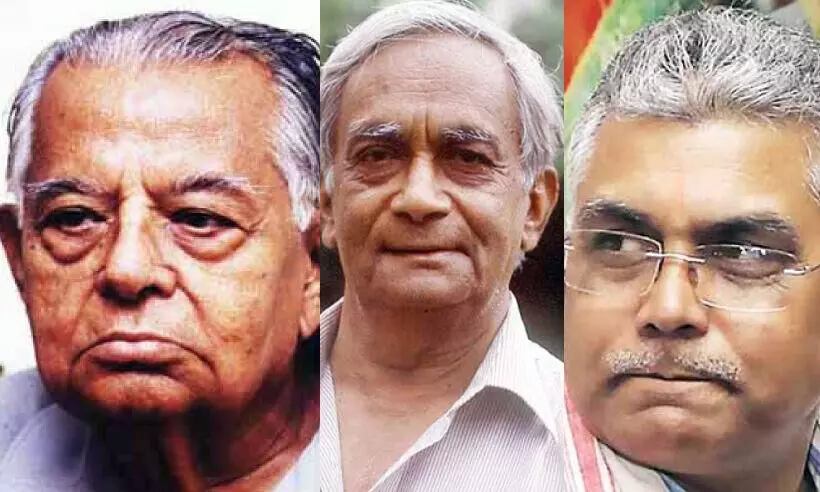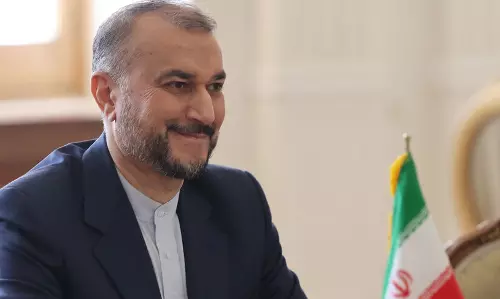

Fearless journalism
text_fieldsAs the friction accelerates between the Centre and the Kashmiri leaders in the Kashmir Valley, how I wish two veteran journalists were still around, in our midst. After all, Nikhil Chakravartty and Ajit Bhattacharjee were probably the first two Indian journalists who had not just spoken out but written extensively about the grave humanr ights violations and the connected aftermath which had begun to spread out in the Kashmir Valley.
Earlier this month, on Nikhil Chakravartty's birth anniversary – he was born 3 November 1913 - I sat reading his features on the unending mess in the Kashmir Valley. He could be termed as one of those journalists who wrote and spoke most fearlessly against the political misrule. His analytical pieces, essays and features focusing on the human rights violations in and around the Kashmir Valley could be termed not just bold but laced with stark facts. He was one of those veteran journalists who had regularly travelled to the Kashmir Valley and believed in delving right into the causes. In fact, his writings on the then situation in the Kashmir Valley should be preserved as they hold out some hard-hitting realities, which paved way for unrest and disasters.
With nostalgia tightening its grip, I'm reminded of my first meeting with Nikhil Chakravartty. It was around the spring of 1987 I had first met him. I was working as a features editor with a magazine and was assigned to do a feature on 'old men '! He was residing in New Delhi's Kaka Nagar - a typical government colony but his ' D11 type' apartment looked 'different'. The outer gate was painted in Post Office red. I still remember that the PO-red painted gate stood out, breaking the monotony, relaying positive vibes. I was left impressed to such an extent that the very next day I went to the nearest market (Khan Market to buy PO-red paint and had all possible doors of my home painted red!
It was a long detailed interview but because of space constraints it is almost impossible to fit in all his quotes but it's important to quote him on the significance of travelling especially if one has to report on the human situation. "How I travel! Well, I catch a bus No reservations about that. Also, I prefer to travel alone. For my profession, traveling is a must as I want to see for myself the situations and the ground realities, whether here in our country, or in Iran, Poland or in Afghanistan… Till date I slog, do a lot of work, as I believe that if an old car is kept in the garage for too long it stops working!" Also stands out his comment on the decay that had already begun to set in and spread out in our country, "In modern Indian society there could be less taboos and individual freedom is encouraged, but do let me add, with emphasis, that with all our modern living, a great amount of insensitivity has crept in. Norms have been shattered. There is no concept of Indian-ness left , and only the RSS and Arun Shourie's views are thriving in this so called Modern India ….We have not developed culturally and that's the root cause of our decay."
************** *************
And author – journalist, Ajit Bhattacharjea, held the distinction of being the first Indian journalist who started reporting from the Kashmir Valley, right from 1947. He wrote for years on the Kashmir situation, travelling in and around the Valley, authored books, including the biography of Sheikh Abdullah.
I would meet Ajit Bhattacharjea regularly here in New Delhi and I'd also met him in Srinagar when we were both in the Valley. And during the course of an interview with me, he had stated , "The first time I had arrived in Srinagar was in 1947, soon after our troops landed there…and I had witnessed the help the Kashmiris had provided in resisting the invasion by the Pathan tribals , sent in by Pakistan …Today the essential tragedy of the situation is the very contrast between the Valley of the late 1940s (when the Kashmiris were resisting the Pathan tribals sent in by Pakistan) with what's seen today . Today it's the same Kashmiris who are crying out 'Azaadi' from India."
To the ' whys' to the changed situation, he had detailed, "Then, there was a link between the Valley people with Sheikh Abdullah and Pandit Jawaharlal Nehru …Mind you, that link was secularism together with socialism, since both these leaders believed in secularism and also in socialism. So the Kashmiris were with India and rejected Pakistan because for them it didn't stand for either socialism or secularism …Also, now over the years, the Hindutva political parties here have exerted their influence over Government of India. With that several other factors came up, like assurances given to Sheikh Abdullah were taken away, the special autonomy promised to J&K gradually was eroded and that meant it could no longer elect its own President and all this made the Kashmiris were disappointed."
He had further said, " There's a sense of alienation amongst the Kashmiris. That sense of alienation had always been there but today it's grown and doubled because of the way we have handled the situation. We have messed up the situation … it amounts to a form of occupation, because of our repressive law and order approach. The only way out now is to invite all concerned for discussions on specific, time-bound measures to revive the autonomy the State enjoyed when it joined the Indian Union."
Another addition to hateful comments... This time from West Bengal
Last fortnight, Bengal BJP chief Dilip Ghosh issued an obvious warning to supporters of Chief Minister Mamata Banerjee at a rally in Haldia. His threat relayed through these words - to quote from news reports - "Didi's brothers who are creating trouble should change their habits in the next six months, otherwise you will have your arms, leg, ribs and head broken. You'll have to take a trip to the hospital. And if you do more than that, then you will have to go the crematorium."























